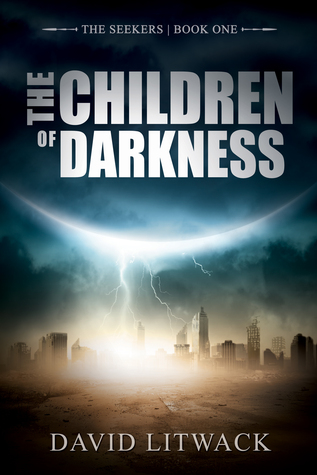 I admit it: I liked this book more than I thought I would for a good while. It's a dystopian book, but that takes a while to come out, and it begins like a humdrum fantasy, which put me off a bit at the beginning. The story starts with a festival in the town of Little Pond, and one of a handful of annual visits by a vicar from Temple City to bestow a blessing of light, deal out medicines, and--unfortunately--take away one of the main characters, Thomas, for a "teaching." Thomas leaves behind his friends Orah, who has prophetic dreams, and Nathaniel, who believes he is destined for greatness. In Temple City, Thomas receives his teaching, showing the horrors of the past age called "the darkness," a time when people used weapons like suns they dropped from the sky against each other. He comes back changed, and shortly after Orah is taken for a teaching of her own--but Nathaniel, determined not to let another of his friends suffer, goes after her, and he, Orah, and Thomas end up on a quest to discover the truth about the darkness and whether the vicars of Temple City have been lying to them their entire lives.
I admit it: I liked this book more than I thought I would for a good while. It's a dystopian book, but that takes a while to come out, and it begins like a humdrum fantasy, which put me off a bit at the beginning. The story starts with a festival in the town of Little Pond, and one of a handful of annual visits by a vicar from Temple City to bestow a blessing of light, deal out medicines, and--unfortunately--take away one of the main characters, Thomas, for a "teaching." Thomas leaves behind his friends Orah, who has prophetic dreams, and Nathaniel, who believes he is destined for greatness. In Temple City, Thomas receives his teaching, showing the horrors of the past age called "the darkness," a time when people used weapons like suns they dropped from the sky against each other. He comes back changed, and shortly after Orah is taken for a teaching of her own--but Nathaniel, determined not to let another of his friends suffer, goes after her, and he, Orah, and Thomas end up on a quest to discover the truth about the darkness and whether the vicars of Temple City have been lying to them their entire lives.Not-so-spoiler: they have. This is pretty much a given in a dystopian book. What makes this interesting in comparison to most modern dystopians, I feel, is that the government in control of the land is a theocracy. In most dystopians published these days, religion has been eliminated or at least pushed to the fringes. In The Children of Darkness, religion--granted, a conglomeration religion and not one of the ones that's currently practiced on Earth--is front and center. I liked this, because it shows how government and religion can be so strongly linked that they can become the same thing, even in places where one isn't actually portrayed as the other. It also makes it harder for the heroes to invoke change, because they're fighting against a doubly-strong force; trying to turn people away from a political structure of life and a religious one is, in theory, twice as hard as trying to turn people from just one of them.
That said, this book can be a bit slow. The quest of looking for the truth about the darkness doesn't progress very quickly; there's not a lot of action. You're not going to find any girls on fire in this book, no teenagers quite literally fighting the power. There's a lot of walking from place to place, admiring of the scenery and creations left over from the previous age, and then a lot of sitting around and learning. This was necessary for the characters, because the main thing they're trying to do is find out the truth; they're not dead-set on overthrowing the system, they just want to know what's really going on. When they do decide to act, they do it with words rather than weapons. I'm skeptical of how successful this would have realistically been, since they never actually emerge into the light and kind of end up with a leaderless movement, but eh. Whatever. However, this non-action might mean that this isn't the book for people looking for something a little more like The Hunger Games. It's a slower, lower dystopian, and it also kind of ends up feeling more like backstory for whatever comes next.
There are supposedly two more books in this trilogy, one of which is currently out. I think I'll read the next one, at least--it involves crossing the ocean, which is a much more intriguing proposition to me than finding the keep was--but I'm also interested in reading another Litwack book I already happen to have, Daughter of the Sea and Sky. I think his writing and world-building skills are strong enough to give another look, even if this one wasn't quite as fast and action-y as I would have thought, and might have liked.
3.5 stars out of 5.
I received this book free from Awesome Indies Books in return for an honest review.
No comments:
Post a Comment